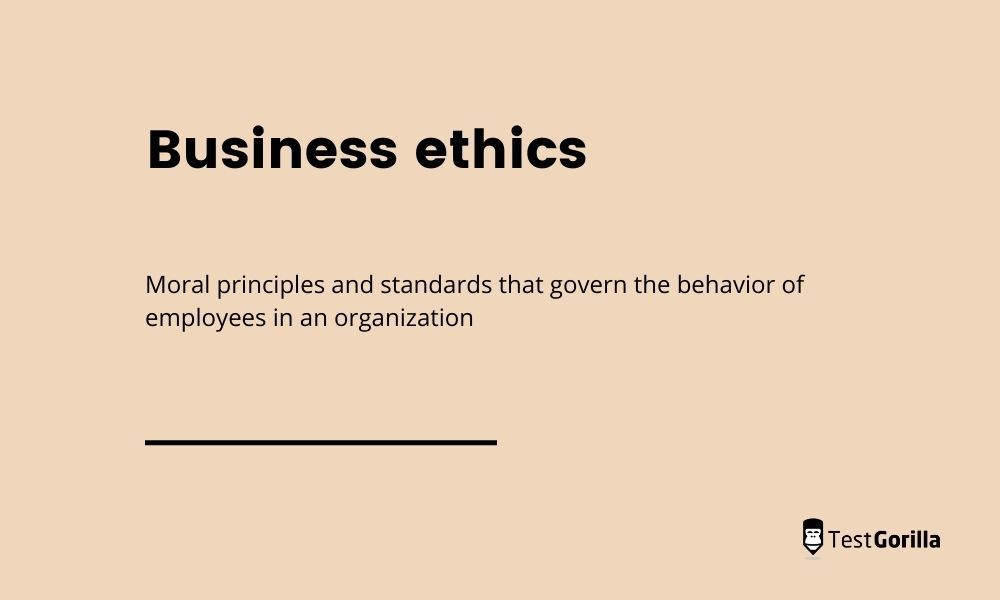Business ethics define how employees behave in the workplace, including how they perform transactions and conduct business generally. However, employees’ conduct outside the workplace affects these ethics in many ways.
As a recruiter seeking to boost your organization’s success, you must assess candidates’ business ethics both in and out of the workplace. This includes their relationships with others, awareness of company guidelines, and business judgment.
There are different ways to test for business ethics during recruitment. But whichever methods you choose, you must make sure to cover the core aspects of business ethics. This will help you avoid mis-hires and identify those who are suitable for the role.
In this article, we will explain the importance of business ethics to your organization and an effective way to test for business ethics.
What are business ethics?
Business ethics refers to moral principles and standards that govern the behavior of employees in an organization. Basically, business ethics differentiate between rights and wrongs in a workplace.
Although there are basic standards all companies should follow, each organization has unique principles that its employees must adhere to. What separates one business from another is the specific way in which it conducts its transactions.
Consequently, business ethics play a vital role in organizational growth and success. These ethics define how your employees conduct themselves in the workplace, relate with each other and customers, and carry out business operations.
It’s essential to define business ethics for your company since they provide guidelines for your employees’ behavior. As such, when you’re hiring for leadership roles, it’s important to find candidates who can follow these guidelines.
Once your company’s leaders adhere to the organization’s business ethics, they will promote your company’s culture and lay a path for other employees to follow.
Why should you test for business ethics?
In recent times, more employees feel the pressure to violate their organization’s standards. This is why it’s crucial to hire employees who will honor your company’s ethics and won’t give in to this pressure.
Testing business ethics not only reduces the risk of mis-hiring but also increases the efficiency with which employees deliver services after you hire them.
Below are reasons why you should test for business ethics while hiring:
1. Build and maintain your reputation
A company’s code of conduct greatly influences its image. As a result of their dedication to following company standards, employees with good business ethics build and maintain your organization’s reputation.
Testing for business ethics while recruiting helps you identify candidates who will work toward improving and sustaining your organization’s image.
2. Enhance productivity
By properly evaluating candidates’ business ethics, you can identify those who possess the skills to enhance your company’s productivity. These candidates can easily develop alongside your company’s culture and help your business stay productive.
3. Encourage teamwork
Candidates with good business ethics understand the importance of teamwork and possess the ability to maintain team spirit. Furthermore, employees in ethical teams trust each other more and learn to work in harmony to deliver the best services.
4. Increase customer loyalty
Employees who value your business ethics can gain loyal customers for your organization. Candidates who adhere to business ethics are better at delivering services to the customer’s satisfaction and the company’s standards.
Moreover, ethical employees help retain customers by treating them as a top priority. By delivering efficient services, they attract more customers to your organization and increase sales as a result.
Testing candidates’ business ethics will enable you to identify those with great business judgment who can handle customer relationships and solve problems as they arise in a professional way.
Did you know that business ethics is a key skill for sustainability managers? That’s why this skill is highlighted in our sustainability manager job description.
The best insights on HR and recruitment, delivered to your inbox.
Biweekly updates. No spam. Unsubscribe any time.
How to test for business ethics
Testing for business ethics helps you find the most suitable candidates for your company who will understand its core values.
The following are some of the different ways you can assess candidates’ business ethics:
1. Surveys
Constructing a survey questionnaire is a method of testing candidates’ business ethics during recruitment. These surveys may include questions that urge applicants to select an option or write an answer themselves.
Adding a survey to your recruitment process helps you predict candidates’ reactions to different situations. This enables you to test their business judgment, compliance with your organization’s culture, and ethics.
2. Physical interviews
Another way to examine the business ethics of candidates is by conducting physical interviews. With this method, you can ask applicants interview questions to gain insight into their ethical conduct.
During physical interviews, it’s essential to follow an interview strategy to identify the right candidates for your organization. However, just using interviews for recruitment might not be enough to assess business ethics properly.
This is because many candidates rehearse what they’re going to say before the interviews even begin. Therefore, you should use another evaluation method alongside interviews to cover any loopholes.
3. CV screening
CVs list candidates’ qualifications: their experience, academic qualifications, skills, and work history.
Thoroughly examining candidates’ CVs might point you toward those who can adapt to your company’s culture and have the problem-solving skills to professionally handle conflicts that could arise in the workplace.
However, many candidates lie on their resumes, which makes CV screening an error-prone practice that could result in expensive mis-hires and additional time and effort. Therefore, it’s not a reliable method of evaluating candidates.
4. Pre-recruitment testing
Due to their flexibility, pre-recruitment tests are the most effective way to evaluate business ethics. These tests help you gain a complete understanding of candidates’ ability to adhere to your organization’s ethics.
Thanks to their diversity and ease of use, pre-recruitment tests are time-efficient and cost-effective.
A business ethics test evaluates candidates’ ability to recognize and avoid conflicts of interest, understand company policies and culture, and realize the effects of unethical behavior on an organization’s growth.
Moreover, you can give applicants more than one test to further assess their fit for the role. Evaluating their business judgment, problem-solving skills, and culture add will help you single out those who would perform best in the position.
Identifying ethical candidates is easy with the right strategy
An organization’s success depends on its employees’ ability to discern right from wrong. Hence, it’s critical to ensure you only recruit candidates who understand the importance of business ethics.
TestGorilla’s library of pre-employment tests provides you with the tools you need to properly test business ethics when recruiting.
Our Business Ethics & Compliance test examines candidates’ awareness, judgment, and knowledge of ethical issues in the workplace.
Furthermore, this test sorts applicants and presents their results in an easy-to-read format so that you can easily spot and recruit applicants who meet your standards. This saves time and reduces costs while improving the quality of your hiring.
Sign up for free with TestGorilla to begin.
Related posts
You've scrolled this far
Why not try TestGorilla for free, and see what happens when you put skills first.




















